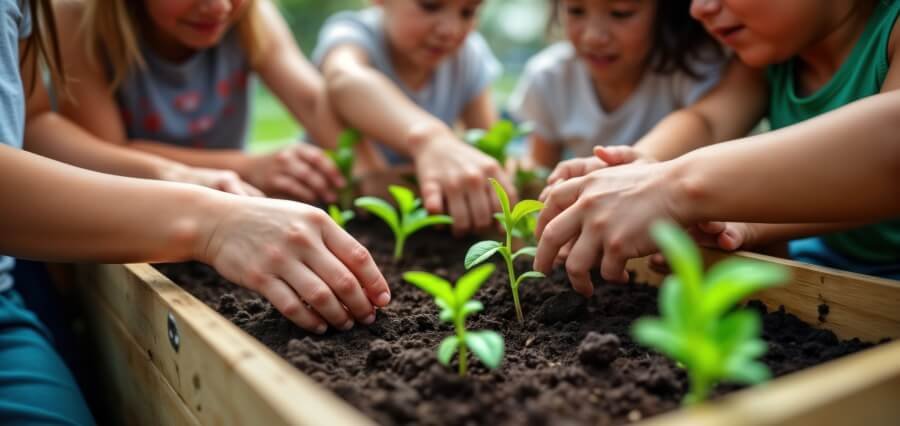On the heels of environment taking center stage in the age of globalization, schools are taking the initiative of being change agents in preparing students for the sustainable future. With the regular formal classroom education being complemented, green school projects are emerging to be effective agents of change when it comes to imparting education in pedagogy, studies of the environment, and development of culture leading to sustainable citizenry. By applying the elements of sustainability in the school community and curriculum, teachers are designing experiential learning processes beyond textbooks and classroom lectures.
Enhancing the Pedagogy Through Eco-friendly School Programs
- Environmental Awareness and Responsibility
Green schools foster a natural consciousness of environmental issues, i.e., global warming, pollution, and depletion processes of natural resources. Sustainability values and interdependence of systems are taught through experiential learning. Green schools teach the sense of responsibility so that children become responsible beings in their environment.
- Integration of Sustainability into the Curriculum
Aside from the science subjects, green school models incorporate the concepts of sustainability into all the other curriculum areas like mathematics and English language arts, social studies, and arts. Interdisciplinary learning guarantees the students acquire environmental literacy as part of education, leading to overall sustainability knowledge.
- Encouraging Hands-on Education and Experiential Learning:
Eco-friendly school programs emphasizes experiential learning and hands-on education. They learn by doing, such as gardening, recycling, composting, and energy auditing, and they learn by practicing skills through applying knowledge to practice in addressing actual problems. Experiential learning allows the retention of the process of knowledge and enhances critical thinking.
- Building Critical Thinking and Problem-Solving Capacity
Environmental issues require problem-solving and critical thinking. Eco-schools compel the students to learn environmental issues, critically think about them, and develop solutions to their effects, with regard to the effects. Problem-solving and critical thinking are learned in the process to equip them to handle future challenging problems.
- Establishing a Culture of Sustainability
Green school programs can range from being periodic to being a part of the school community’s culture of sustainability. Some of the examples are starting recycling, energy conservation, and promoting environmentally friendly transport. Integrating sustainability into the day-to-day operation of the school is an example that inspires the students to adopt sustainable living.
- Increased Community Engagement and Coordination among Organizations
Local communities, business, and environment groups will also be operating eco-friendly school programs. It is this that gives the sense of ownership to citizens and allows the students to learn from real experts and campaigns. All that has been prepared makes school environmental programs improved to be more efficient in the area of output.
- Health and Well-being Promotion
Influence of Nature on Physical and Mental Health
Interaction with nature has effects on the physical and mental health of people in various ways. Nature walking, gardening, and sanitation are all part of most eco-friendly school programs. All these contribute to making the children physically healthy, lower their level of stress, and enhance their overall status.
- Sense of Responsibility and Civic Engagement
Eco-friendly school programs promote civic duty and civic responsibility. Students learn that their decisions count in the world and can change it. This empowers them and turns students into change agents for building a sustainable world.
- Empowering Future Environmental Leaders
By exposing the students to environmental factors and leadership, green schools introduce the future green leaders. Eco-friendly school programs also expose the students to vulnerability for sustainability and familiarize them with environmental studies.
- School Gardening and Green Space Development:
School garden and green spaces offer the practical learning through which the students are introduced to green agriculture development, plant growth, and the ecosystem.
- Energy Audits and Energy Efficiency Programs:
Energy efficiency programs and energy audits alert the students to the consumption of energy and generate awareness for other resources.
- Waste Reduction and Recycling Programs:
Waste reduction methods and recycling processes inform the students about reducing wastage and conserving resources.
- Environmental Awareness Campaigns and Activities
Environmental education awareness programs and activities, such as environmental festivals and Earth Day fairs, remind people why and how they must be environmentally responsible.
- Institutionalizing Environmental Education in School Policy:
Institutionalizing environmental education into school policy will ensure that sustainability is embedded within the school purpose and practice.
Apart from environmental education in schools through eco-friendly school programs, the entire education is being transformed. Green school programs equip students with the knowledge, ability, and mindset to construct a greener and a more just future for everyone.





